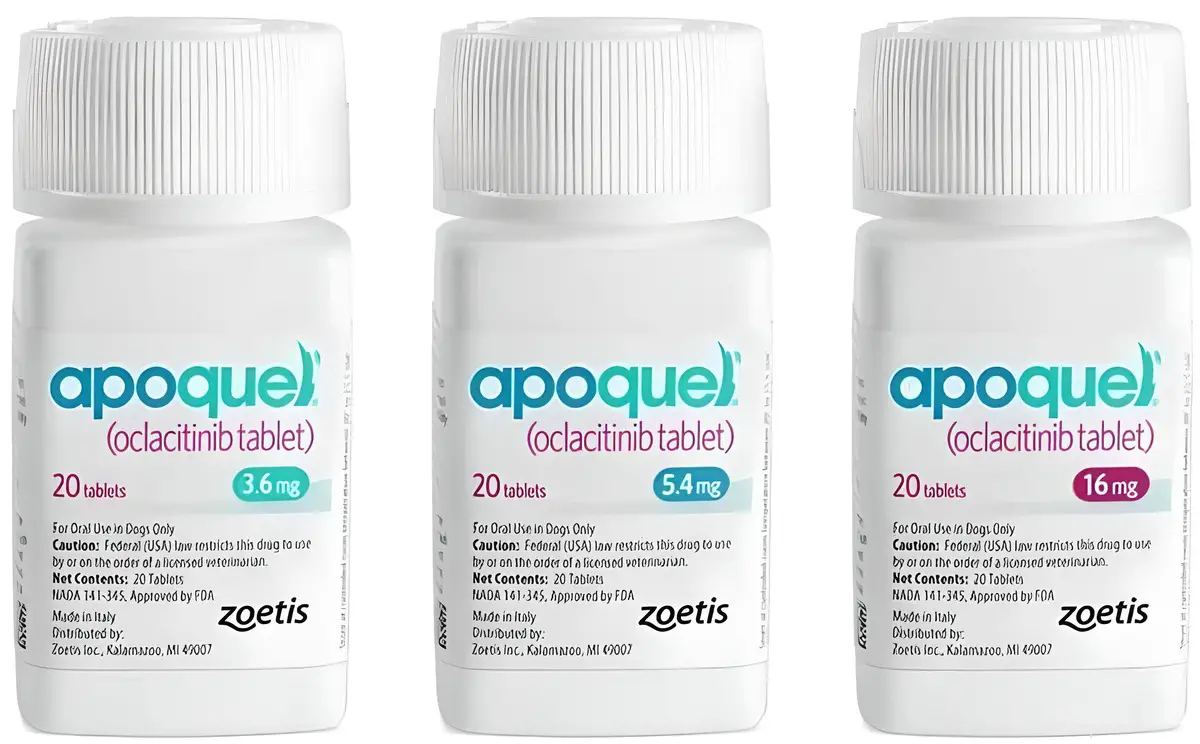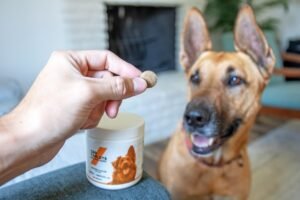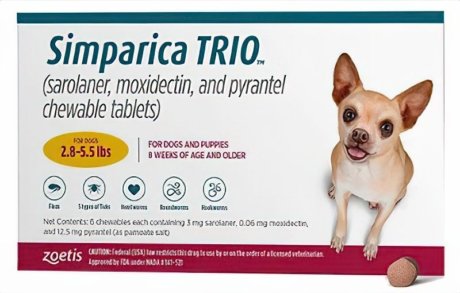Apoquel for Dogs : A Comprehensive Guide to Canine Allergy Relief
Our beloved canine companions, much like humans, can fall victim to a range of allergies that can profoundly affect their quality of life. These allergies can manifest in various ways, including skin irritations, food sensitivities, and reactions to environmental factors, leading to incessant itching and discomfort. Fortunately, there’s a groundbreaking solution in the world of canine allergy relief – Apoquel for Dogs.
Understanding Canine Allergies

Types of Allergies in Dogs
Allergies in dogs are diverse and can be categorized into several distinct types, each with its own set of symptoms and triggers:
1. Skin Allergies
Skin allergies are among the most prevalent forms of allergic reactions in dogs. They manifest as itching, redness, rashes, and skin irritation, often leading to secondary infections if left untreated.
2. Food Allergies
Food allergies occur when a dog’s immune system reacts to specific ingredients in their diet. Symptoms may encompass digestive issues, skin problems, chronic ear infections, and behavioral changes.
3. Environmental Allergies
Environmental allergies in dogs are triggered by substances like pollen, dust mites, or mold spores. These allergies result in symptoms such as sneezing, runny noses, watery eyes, and skin irritation.
Identifying the precise type of allergy affecting your dog is essential for determining the most effective treatment strategy.
The Impact of Allergies
The consequences of allergies on a dog’s life go beyond physical discomfort. If not managed properly, allergies can escalate into more severe health problems. Skin allergies, for instance, can lead to the development of hot spots, chronic infections, and extensive hair loss.

Beyond the physical aspect, allergies can significantly affect a dog’s behavior. Dogs enduring constant itching and discomfort may become irritable, restless, and anxious. It’s evident that allergies are not just a minor inconvenience; they can profoundly affect a dog’s quality of life.
Apoquel for Dogs
What Is Apoquel?
Apoquel is a revolutionary medication explicitly designed to alleviate the distressing symptoms associated with allergies in dogs. It belongs to a class of drugs known as immunosuppressants, which function by modulating the immune system’s response to allergic triggers.
Apoquel 16mg For Dogs
Apoquel (generic name: oclacitinib) is a medication prescribed for dogs to manage itching and inflammation associated with skin allergies, including allergic dermatitis and atopic dermatitis. The 16mg dosage strength is typically used for larger dogs or dogs with more severe symptoms.
The active ingredient, oclacitinib, works by targeting specific receptors in the dog’s immune system that are involved in the allergic response. This can help provide relief from itching and discomfort caused by allergies.
The dosage and administration of Apoquel should always be determined by a veterinarian, as it can vary depending on the dog’s size, weight, and the severity of the allergic symptoms. It’s essential to follow the vet’s instructions carefully and avoid adjusting the dosage without their guidance.
Apoquel 5.4 Mg For Dogs
Apoquel (oclacitinib) is a prescription medication used to alleviate itching and inflammation in dogs with allergic skin conditions, such as allergic dermatitis and atopic dermatitis. The 5.4mg dosage strength is typically used for smaller dogs or those with less severe allergic symptoms.
The active ingredient, oclacitinib, targets specific receptors in the dog’s immune system that are involved in the allergic response. This can provide relief from itching and discomfort associated with allergies.
The precise dosage and administration of Apoquel should always be determined by a veterinarian. The vet will consider the dog’s weight, size, and the severity of the allergic symptoms when prescribing the appropriate dosage. It’s crucial to adhere to the vet’s instructions closely and not make any adjustments to the dosage without their guidance.
How Apoquel Works
Apoquel’s mechanism of action is one of its most fascinating aspects. It works by selectively inhibiting specific signals in a dog’s immune system that are responsible for initiating and sustaining the allergic response. Unlike traditional treatments that often include steroids, Apoquel provides relief without the drawbacks commonly associated with such medications.
Is Apoquel Safe For Dogs
Apoquel (oclacitinib) is generally considered safe for dogs when used as prescribed by a veterinarian. It is a prescription medication commonly used to manage allergic skin conditions in dogs, particularly itching and inflammation. Here are some key points to consider regarding the safety of Apoquel for dogs:
- Prescription Medication: Apoquel is a prescription medication, which means it should only be administered to dogs under the guidance and supervision of a licensed veterinarian. Your vet will determine the appropriate dosage and treatment plan based on your dog’s specific condition and health history.
- Well-Tolerated: Apoquel is well-tolerated by many dogs and has been shown to provide effective relief from itching and inflammation. It typically works rapidly, often within hours, providing relief for dogs suffering from allergic skin conditions.
- Safety Studies: Apoquel has undergone extensive safety testing and clinical trials. These studies have demonstrated its safety and efficacy when used as directed by a veterinarian.
- Short-Term and Long-Term Use: Apoquel is commonly used for both short-term and long-term management of allergic skin conditions. Your veterinarian will determine the most suitable treatment duration for your dog’s specific case.
- Potential Side Effects: Like any medication, Apoquel may have potential side effects. These can include mild to moderate side effects such as diarrhea, vomiting, and decreased appetite. Severe side effects are less common but can include bacterial and fungal skin infections, as Apoquel can suppress the immune system. Regular check-ups with your veterinarian can help monitor your dog’s health and address any side effects promptly.
- Safety Monitoring: It’s essential to work closely with your veterinarian to ensure the safe use of Apoquel. Your vet will assess your dog’s response to the medication and may make adjustments to the dosage or treatment plan as needed.
- Contraindications: Apoquel should not be used in dogs with certain health conditions or those that have a history of sensitivity to the medication. Your veterinarian will consider these factors before prescribing Apoquel.
Apoquel For Dogs Price
The price of Apoquel for dogs in the USA can vary depending on the factors mentioned earlier, such as dosage and quantity. On average, you might expect to pay around:
- Approximately $1 to $2 per 3.6 mg tablet.
- Approximately $2 to $3 per 5.4 mg tablet.
- Approximately $4 to $5 per 16 mg tablet.
Benefits of Apoquel

Rapid Relief
One of Apoquel’s most notable advantages is its ability to provide swift relief from allergic symptoms. Many dogs experience a significant reduction in itching and inflammation within hours of taking the medication. This rapid response not only alleviates the dog’s suffering but also improves their overall comfort and well-being.
Minimized Side Effects
In comparison to traditional allergy treatments, which can come with a range of undesirable side effects, Apoquel is renowned for its minimal adverse reactions. Dogs undergoing Apoquel treatment generally experience fewer side effects, making it a safer and more sustainable long-term option.
Long-Term Benefits
Apoquel isn’t just about immediate relief; it also offers promising long-term benefits. This makes it an appealing choice for managing chronic allergies in dogs. With Apoquel, your furry companion can enjoy enduring relief from allergies, enhancing their overall quality of life.
Using Apoquel Safely
Dosage and Administration
To ensure the safe and effective use of Apoquel, it’s essential to follow your veterinarian’s prescribed dosage and administration instructions meticulously. The dosage is typically determined based on your dog’s weight and the severity of their condition.
Precautions and Considerations
While Apoquel is generally safe, there are several precautions and considerations to keep in mind. For example, Apoquel is not recommended for use in pregnant or nursing dogs, as its effects on fetal development and lactation are not well understood. It’s crucial to discuss your dog’s health history and any existing conditions with your vet before initiating Apoquel treatment.
Monitoring Your Dog’s Progress
Regular monitoring of your dog’s response to Apoquel is crucial. If you notice any changes in their condition or if the medication appears to be losing effectiveness over time, it’s imperative to consult your veterinarian promptly. They can make the necessary adjustments to ensure that your dog continues to experience the maximum benefits of Apoquel.
Apoquel Dosage For Dogs
The appropriate Apoquel dosage for dogs can vary depending on the individual dog’s size, weight, and the severity of their allergic symptoms. Apoquel (generic name: oclacitinib) is typically available in three tablet strengths: 3.6mg, 5.4mg, and 16mg. Here are some general guidelines for dosing:
- Apoquel 3.6mg: This lower dosage strength is typically prescribed for smaller dogs, especially those with mild to moderate allergic symptoms.
- Apoquel 5.4mg: The 5.4mg strength is often recommended for dogs of moderate size and those with moderate to severe allergic symptoms.
- Apoquel 16mg: The 16mg tablets are generally prescribed for larger dogs or dogs with severe allergic symptoms.
It’s crucial to note that only a licensed veterinarian should determine the exact Apoquel dosage for your dog. They will consider your dog’s weight, size, and the specific nature and severity of their allergies before prescribing the appropriate strength and dosage regimen. It’s also essential to strictly follow your veterinarian’s instructions for administering Apoquel to ensure your dog’s safety and the effectiveness of the treatment.
Apoquel Dosing Chart For Dogs
Here are Apoquel dosing chart for dogs that includes information about the number of days, dosing frequency, and treatment duration:
| Dog’s Weight (in pounds) | Apoquel Dosage (per day) | Dosing Frequency | Treatment Duration |
|---|---|---|---|
| 3.6 – 5.4 lbs | 0.5 mg | Once daily | As prescribed by the veterinarian |
| 5.5 – 9.9 lbs | 1.0 mg | Once daily | As prescribed by the veterinarian |
| 10.0 – 14.9 lbs | 1.5 mg | Once daily | As prescribed by the veterinarian |
| 15.0 – 19.9 lbs | 2.0 mg | Once daily | As prescribed by the veterinarian |
| 20.0 – 29.9 lbs | 3.0 mg | Once daily | As prescribed by the veterinarian |
| 30.0 – 44.9 lbs | 4.0 mg | Once daily | As prescribed by the veterinarian |
| 45.0 – 59.9 lbs | 5.0 mg | Once daily | As prescribed by the veterinarian |
| 60.0 – 89.9 lbs | 6.0 mg | Once daily | As prescribed by the veterinarian |
| 90.0 – 129.9 lbs | 8.0 mg | Once daily | As prescribed by the veterinarian |
| Over 130 lbs | Consult your veterinarian for the appropriate dosage, dosing frequency, and treatment duration. |
Apoquel For Dogs Without Vet Prescriptio

Apoquel is a prescription medication used to manage allergic skin conditions in dogs, such as itching and inflammation. It’s important to note that obtaining Apoquel or any prescription medication without a valid prescription from a licensed veterinarian is illegal and potentially harmful to your dog’s health. Here’s why:
- Safety: A veterinarian prescribes medications based on a thorough evaluation of your dog’s health, medical history, and specific condition. Using Apoquel without proper assessment and guidance can lead to adverse reactions or unintended side effects.
- Proper Diagnosis: Allergic skin conditions in dogs can have various causes, and Apoquel may not be appropriate for every case. A veterinarian is trained to diagnose the specific underlying issue and recommend the most suitable treatment.
- Dosage and Administration: The correct dosage of Apoquel varies depending on the dog’s size, condition, and other factors. Your veterinarian will provide the right dosage and instructions for administration to ensure the medication’s effectiveness.
- Monitoring: When your dog is prescribed Apoquel, your veterinarian will also monitor your pet’s response to the medication, making necessary adjustments if required.
- Legal and Ethical Considerations: Obtaining prescription medications without a valid prescription is not only illegal but also goes against ethical principles of responsible pet ownership and proper veterinary care.
Potential Side Effects of Apoquel
Common Side Effects
Although Apoquel is generally well-tolerated, some dogs may experience mild and temporary side effects, including diarrhea, vomiting, or lethargy. These side effects usually resolve on their own and do not necessitate discontinuing Apoquel.
Rare Side Effects
While uncommon, more severe side effects can occur, such as an increased susceptibility to infections or gastrointestinal disturbances. Should you observe any concerning symptoms, it is essential to contact your veterinarian immediately for further evaluation and guidance.
Mitigating Side Effects
To mitigate potential side effects, it’s recommended to administer Apoquel with a full meal. This can help reduce the risk of gastrointestinal discomfort. Always adhere to your veterinarian’s recommendations and communicate any side effects your dog experiences.
Apoquel vs. Alternative Treatments
Is There An Alternative To Apoquel For Dogs
Yes, there are alternative medications and treatment options for managing allergic skin conditions in dogs if Apoquel is not suitable or available. Here are some alternatives:
- Cytopoint (Lokivetmab): Cytopoint is a prescription medication that targets a specific immune response involved in allergic reactions. It’s administered by injection and can provide relief from itching for about 4-8 weeks. It’s a good alternative for dogs who can’t tolerate oral medications or have specific contraindications to Apoquel.
- Atopica (Cyclosporine): Atopica is another prescription medication that can help manage allergic skin conditions in dogs. It works by suppressing the immune response that leads to allergies. It’s available in capsule form and often used for longer-term control of allergies.
- Steroids (Prednisone or Prednisolone): Steroids are potent anti-inflammatory drugs that can provide relief from itching and inflammation associated with allergies. They are available in various forms, including tablets, and can be effective. However, they may have more potential side effects compared to some other options.
- Allergen-Specific Immunotherapy (ASIT): This treatment involves desensitizing your dog to specific allergens over time. It’s a long-term approach that requires testing to identify allergens and the preparation of custom allergy shots.
- Topical Therapies: Medicated shampoos, sprays, and ointments can help manage skin conditions and itching. These can be used in conjunction with other treatments.
- Change in Diet: Some dogs may benefit from hypoallergenic or limited-ingredient diets. These can help identify and eliminate potential food allergies that could be contributing to skin problems.
- Environmental Changes: Reducing exposure to allergens in your dog’s environment can help. This includes using air purifiers, regular cleaning, and avoiding known allergens.
Apoquel Vs Zyrtec For Dogs
Here’s a comparison and differences between Apoquel and Zyrtec for dogs:
| Aspect | Apoquel | Zyrtec (Cetirizine) |
|---|---|---|
| Type of Medication | Prescription medication | Over-the-counter (OTC) medication |
| Active Ingredient | Oclacitinib | Cetirizine |
| Usage | To manage allergic skin conditions | To relieve allergy symptoms (itching, sneezing, etc.) |
| Mechanism of Action | Targets specific immune responses | Blocks histamine receptors |
| Efficacy | Rapid relief from itching and inflammation | Relief from mild allergy symptoms |
| Prescription Required | Yes | No (available OTC) |
| Dosage | Veterinarian-prescribed based on dog’s weight and condition | Generally based on the dog’s size, typically 0.5 mg per pound |
| Potential Side Effects | Mild to moderate, including diarrhea, vomiting, and decreased appetite | Mild and rare, including drowsiness and upset stomach |
| Safety | Safe when used as prescribed; should not be used in dogs with certain health conditions | Generally safe when used as directed, but not suitable for all dogs |
| Effect on Drowsiness | May cause drowsiness in some dogs | May cause drowsiness in some dogs |
| Onset of Action | Rapid, often providing quick relief | May take longer to show full effect |
| Use in Long-Term | Typically used for specific periods to manage flare-ups | Often used on an ongoing basis for chronic allergies |
| Suitability | Recommended for moderate to severe allergic skin conditions | Suitable for mild allergy symptoms or as a supplement to other treatments |
| Consult a Veterinarian | Yes, for proper diagnosis and prescription | Not always necessary but advisable for specific cases |
Comparing Apoquel to Steroids
Apoquel boasts several advantages over traditional steroid treatments for allergies. Steroids can provide relief but often come with an array of side effects, including increased thirst, hunger, and potential long-term health risks. Apoquel’s targeted approach minimizes these risks, making it a safer and more effective choice for many dogs.
Apoquel vs. Antihistamines
Antihistamines are another common treatment for allergies in dogs. However, their effectiveness can vary widely among individual dogs, and some may not respond well to them. Apoquel, with its rapid and reliable relief, is often preferred, particularly for severe allergies.
Natural Remedies vs. Apoquel
The market is replete with natural remedies and dietary supplements promoted as alternatives to pharmaceutical allergy treatments. While some of these remedies may offer limited relief, Apoquel stands out due to its proven efficacy and the speed at which it delivers relief. For many dog owners, the peace of mind and tangible results provided by Apoquel make it a trusted choice.
Real-World Experiences
Testimonials
Real-life testimonials from dog owners who have turned to Apoquel can offer invaluable insights into its effectiveness. These personal accounts provide a glimpse into how Apoquel has transformed the lives of countless dogs, often with heartwarming results.
Success Stories
Reading about success stories where dogs’ lives were significantly improved by Apoquel can provide hope and inspiration. These narratives underscore the substantial positive impact that Apoquel can have on dogs and their owners.
Case Studies
In-depth case studies can provide a more scientific perspective on Apoquel’s effectiveness. These studies rigorously examine the outcomes of Apoquel treatment in allergic dogs, offering valuable data and insights that further corroborate its efficacy.
Apoquel and Different Breeds

Breed-Specific Considerations
It’s important to acknowledge that Apoquel may produce varying effects in different dog breeds. Some breeds may be genetically predisposed to specific allergies, and individualized treatment plans are crucial to ensure the best possible outcomes.
Apoquel and Special Situations
Apoquel for Senior Dogs
Senior dogs often have unique health considerations, and the use of Apoquel in older dogs should be discussed thoroughly with a veterinarian. Senior dogs may have reduced immune function or other age-related health issues that need careful consideration. Additionally, their experience and overall well-being should be closely monitored.
Apoquel for Puppies
The safety and efficacy of Apoquel for puppies require thoughtful deliberation. Young dogs have distinct health needs, and any treatment plan should consider their age, development, and potential long-term effects. Consultation with a veterinarian is vital in determining the appropriateness of Apoquel for puppies.
Conclusion:
In conclusion, Apoquel for dogs represents a groundbreaking solution in the realm of allergy management. If your dog is struggling with allergies, consult your veterinarian to explore the full spectrum of benefits that Apoquel can offer. By doing so, you can provide your furry companion with the relief and comfort they genuinely deserve, ultimately enhancing their quality of life.
Frequently Asked Questions
-
Is Apoquel safe for long-term use?
Apoquel is generally considered safe for long-term use when prescribed and monitored by a veterinarian. Regular check-ups and ongoing communication with your vet are essential to ensure your dog’s continued well-being.
-
Can Apoquel be used in puppies?
Apoquel is typically approved for use in dogs older than 12 months. For puppies or very young dogs with allergies, consult your vet for alternative treatment options.
-
How quickly does Apoquel start working?
Many dogs experience noticeable relief within 4 to 24 hours after taking Apoquel. However, individual responses may vary, so patience and close observation are essential.
-
Are there any drug interactions with Apoquel?
It’s crucial to inform your veterinarian about any other medications or supplements your dog is taking to avoid potential interactions that could affect Apoquel’s efficacy or safety.
-
Can Apoquel be used alongside other allergy treatments?
In some cases, your veterinarian may recommend combining Apoquel with other allergy treatments to create a more comprehensive approach tailored to your dog’s specific condition.
-
What are the long-term effects of Apoquel use in dogs?
The long-term effects of Apoquel use in dogs may include improved quality of life, reduced complications related to allergies, and overall enhanced well-being.
-
Is Apoquel available over-the-counter?
Apoquel is a prescription medication and can only be obtained through a veterinarian’s recommendation and prescription. It is not available over-the-counter.
-
How should Apoquel be stored?
Apoquel should be stored in a cool, dry place, away from direct sunlight and out of reach of children and pets. Proper storage ensures the medication’s efficacy and safety.
-
Can Apoquel be used for conditions other than allergies?
Apoquel is primarily intended for managing allergies in dogs. Any alternative uses should be discussed thoroughly with your veterinarian to ensure safety and effectiveness.
-
Are there any natural alternatives to Apoquel?
While some natural remedies and dietary adjustments may complement allergy management, it is essential to consult your veterinarian before making significant changes to your dog’s treatment plan. They can provide guidance on safe and effective natural alternatives.
-
Can Apoquel be used for seasonal allergies?
Yes, Apoquel can be used to alleviate symptoms associated with seasonal allergies in dogs. It is effective in providing relief from itching, redness, and discomfort caused by environmental allergens like pollen and grass.
-
Is Apoquel safe for pregnant dogs?
The safety of Apoquel in pregnant dogs has not been extensively studied. It is generally recommended to avoid using Apoquel in pregnant dogs unless the potential benefits clearly outweigh the risks. Consult with your veterinarian for guidance in such cases.
-
Can Apoquel be used for itching related to flea allergies?
Apoquel can help alleviate itching caused by flea allergies in dogs. However, it is essential to address the flea infestation itself through proper flea control measures, such as topical treatments or flea prevention products, in conjunction with Apoquel.
-
How long can my dog take Apoquel continuously?
The duration of Apoquel use can vary depending on your dog’s specific condition and response to the medication. In some cases, dogs may require long-term treatment. Your veterinarian will assess your dog’s needs and recommend an appropriate treatment plan, including the duration of Apoquel use.
-
Can Apoquel be used for food allergies?
Apoquel is primarily designed to manage allergies triggered by environmental factors. It may not be as effective for addressing food allergies. If your dog is suspected of having food allergies, your veterinarian may recommend dietary changes and alternative treatments.
-
Is Apoquel suitable for dogs with autoimmune disorders?
The use of Apoquel in dogs with autoimmune disorders should be carefully considered and monitored by a veterinarian. While it can be effective in managing allergies, it may affect the immune system, potentially exacerbating autoimmune conditions. Consult with your vet to weigh the risks and benefits.
-
Are there any age restrictions for Apoquel use in dogs?
Apoquel is typically approved for use in dogs older than 12 months. Puppies and very young dogs with allergies may require alternative treatments or therapies tailored to their age and development.
-
Can Apoquel be used for itching related to skin infections?
Apoquel can provide relief from itching associated with skin infections in dogs. However, addressing the underlying infection with appropriate antibiotics or antifungal medications is crucial for comprehensive treatment.
-
What should I do if my dog misses a dose of Apoquel?
If your dog misses a dose of Apoquel, administer it as soon as you remember. However, if it is close to the time for the next scheduled dose, skip the missed one and continue with the regular dosing schedule. Do not double up on doses.
-
Can Apoquel be used for dogs with pre-existing health conditions?
Dogs with pre-existing health conditions, such as liver or kidney disease, may require special consideration when using Apoquel. It’s essential to discuss your dog’s specific health history with your veterinarian to determine if Apoquel is a suitable treatment option.
Recommended:
How Long Are Dogs Pregnant? A Comprehensive Guide with Care, Food, Signs, Health
Pancreatitis in Dogs | Causes, 6 Symptoms, Diagnosis, Treatment, Prevention, and FAQs





























